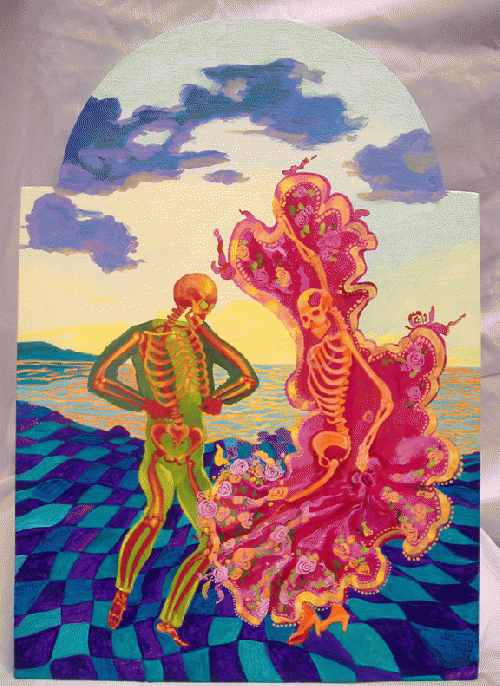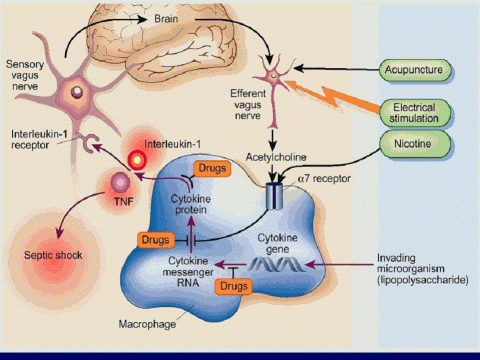 Lewis Mehl-Madrona: Working to Recover, or Adjusting to Illness? Existing research is pessimistic about the value of our currently dominant biomedical paradigm for treating mental illness. Long-term antipsychotic use appears to make people worse rather than better. While the research continues to accumulate, practice does not change. Doctors continue to practice as if psychosis comes from lack of medication. People recover without medications. How do we reconcile these two models? 1 |
Helen Gibbons: The 6 Hour Solution to Work stress
Helen Gibbons, Chief Psychologist and pioneer of Autogenic Training in Australia,discusses the benefits of Autogenic Training in combating work stress, particularly in the Mining and other high risk industries. Developed by German Neuroscientist Dr Schultz, AT is backed by over 3,000 clinical studies worldwide and is used by NASA astronauts to help them adapt to the physical and psycholocial stressors of space travel. 1 |
Lewis Mehl-Madrona: NIMH and its Biologic Emphasis
I respond to Dr. Thomas Insel's blog about his views of the top ten advances for mental health for 2012. What saddens me is that all of these advances are heavily biological and that biological medicine hasn't really succeeded very well in improving our mental health. While these advances are very interesting, I argue that what we need is more understanding of how our social relationships form our brains and behavior. 1 | |||
|
Lewis Mehl-Madrona: Pain, Part 2
I continue to reflect upon chronic pain, beginning with some comments from my colleague, Peter Blum, who is a hypnotherapist and all around healer-guy in Woodstock, NY, and then leading into some brain science that shows that our brains are changed by the experience of pain and begin to link all kinds of unrelated experiences to that pain so that pain becomes multiply determined by more than just the sensations. |
Lewis Mehl-Madrona: Chronic Pain and Opiates
I describe my struggle with prescribing opiates for people in chronic pain. My observation has been that my patients on opiates don't seem to be in any less pain than my patients not on opiates, and sometimes they are more grumpy. I explore the literature and learn that prolonged opiate use sensitizes people to feel more pain and that it can also act as a neurotoxin producing neuropathic-like pain, so perhaps not a good idea |
 Lewis Mehl-Madrona: The Inflammatory Theory of Depression In this article, I describe a way of thinking about depression that makes sense of how we collapse from too much stress and from unremitting anxiety and misery. In this theory, eventually life overwhelms our capacity to resist inflammation and it runs away. From August 16th through the 19th, catch me in Hartford, Connecticut, to further discuss these ideas. For details, see
| Lewis Mehl-Madrona: The High Cost of Medically Unexplained Symptoms
I write about how the search for the diagnosis for medically unexplained symptoms is an important aspect of what is bankrupting our health care system. We have to solve this problem for manage costs no matter what health care system we have. I acknowledge that some diseases are missed and that some diseases are yet to be found, but suggest that we are much better at findings serious and life threatening illnesses than before.
| Lewis Mehl-Madrona: Narrative and Science: Day 13 of the Australian Journey
Today was our last full day in Australia and the occasion for a lecture and series of discussions at the University of Melbourne's Center for International Mental Health and School of Population Health. We explored the bridges between science and the indigenous world view of narrative. Particularly we were impressed with how neuroscience is completely supporting indigenous knowledge about narrative and its importance!
| Judith Acosta: Clingy Children: Signals for Verbal First Aid
Our ability to deal with fear as children is the foundation for the way we deal with fear as adults--both for ourselves and with our kids. Most of us were not raised with these ideas and some of them may feel awkward or even seem unnecessary, especially if we ourselves were dismissed when we were afraid or hurt. |
|
Lewis Mehl-Madrona: Beyond Narrative Therapy: Day 11 of the Australian Journey
On Day 11, we engaged in dialogue about the narrative therapy of Michael White, which is what most people in Australia and the United States index, when we say narrative practices, and the narrative practices of indigenous people. While we deeply respect Michael White's contributions to psychology and humanity, we present him as one branch on a tree of narrative in which indigenous people live in the trunk and the roots. 1 |
Lewis Mehl-Madrona: Implementing Narrative Practices: Day 9 in Australia
The highlight of Day 9 in our Australian cross-cultural mental health journey was a workshop for indigenous mental health and human service providers on how to make their services more indigenous friendly. This involves, of course, conscious decolonization of our clinical practices. We talked about the need to become more narrative, to listen longer and more deeply to the stories people tell us and to hear stories of others. |
Lewis Mehl-Madrona: Imaging and doing are not as different as they sound
Contemporary neuroscience has shown us that imagining an act and performing an act are virtually the same. We can strength our muscles almost as much by imagining exercising as by exercising. If mind is so powerful, why aren't we harnessing it for the good. I fear that mostly we allow it to run for the bad, imagining ourselves in any number of dire straights and illnesses, instead of imagining ourselves hale as we should. 1 | |||
|
Lewis Mehl-Madrona: Why Learn Neuroscience?
A student asked me why she needed to know neuroscience. Here is my answer. I argue that science is the new story with which we must contend. If we do not know the contemporary stories of science, they will be used against us. The actual stories being told today about the brain are quite uplifting, full of hope. They include neuroplasticity and epigenetics. If we know these stories we can fight against bad neuroscience. 1 |
Dr. Kathleen Albertson, L. Ac., PhD: The four Stages of Fatigue: Which one are you in? How can TCM combat it?
Did you know that fatigue slowly expresses itself in four stages in your body? Did you know that it crawls deeper and deeper deteriorating all of your key organ systems? Fatigue has an uncanny way of starting out as an occasional situation that we assume will go away. Often, it doesn't. We do not slow down and get the rest we need---we merely push ourselves harder. At what expense? TCM helps. |
Lewis Mehl-Madrona: NICABM and MInd-Body Medicine
I reflect upon the contributions of the National Institute for the Clinical Advancement of Mind-Body Medicine toward furthering the field. At their upcoming conference this December, prominent are newer ideas of neuroplasticity and chronic pain. Through the understanding that pain circuitry in the brain are remodeled by the experience of pain so as to make people feel more pain, we can refute old ideas of pain. 1 | |||
|
Lewis Mehl-Madrona: Walking with Dementia
Unexpectedly I find myself visiting a friend for the weekend who is helping his mother place his father into a long-term care facility. My friend's father has vascular dementia, the result of a series of strokes, each one of which rendering him progressively less capable. Nevertheless, we have a marvelous walk in which he demonstrates the unassailable curiousity of human beings for describing the motivations of others. 1 |
Rick Hanson PH.D.: The First and Second Dart To borrow an expression from the Buddha, inescapable physical or mental discomfort is the "first dart" of existence. As long as you live and love, some of those darts will come your way. First darts are unpleasant to be sure. But then we add our reactions to them. These reactions are "second darts"--the ones we throw ourselves. Most of our suffering comes from second darts. |
Vidya Bolz: Trauma, Health and Neurofeedback
summary of Dr. Robert Scaer's excellent video on his work on trauma and how it is stored in neural networks 1 | |||
|
Dr. Clare Albright: Neurofeedback in the Treatment of Addiction
Is neurofeedback a helpful adjunct to drug and alcohol rehabilitation treatment? |
Lewis Mehl-Madrona: Why do we need Stories?
Making up story is what are brains do best. In fact, the default mode of the brain is to idly invent what if and if only stories to so that we can run simulations of our social world. We are designed to fill in gaps in our perception. We must reject much environmental information in order to maintain a stable world map. |
Rob Kall: The Self-Transforming Brain; Excerpt from Buddha's Brain; The practical neuroscience of happiness, love and wisdom What flows through your mind sculpts your brain. Thus, you can use your mind to change your brain for the better--which will benefit your whole being, and every other person whose life you touch. This book aims to show you how. You'll learn what the brain is doing when the mind is happy, loving, and wise. | |||
|
Ash Rehn: What is Sex Addiction? Questions from a Narrative Psychotherapy Perspective
This article examines the problems with the idea of Sex Addiction, and the possibilities for revealing more helpful and relevant understandings of problems that come from using the techniques of Narrative Therapy. 1 |
Dr. Kathleen Albertson, L. Ac., PhD: Acupuncture and Chinese Herbal Medicine in the Treatment Gynecology Related Problems: Bridging the Medical Gap!
Traditional Chinese medicine includes acupuncture and the use of Chinese herbs formulated specifically or your condition.
For 5000 years, gynecology related conditions have been effectively treated with the use of TCM. Western medicine as were know it has only been in existence for 200+years.
Learn what conditions TCm treats and to bridge the gapin your hhealth care. |
Lewis Mehl-Madrona: Who's in Charge Anyway?
To what degree do we control our lives? Advocates of The Secret claim we have complete power to create whatever we wish. A more realistic world view is that of the Lakota who believe we are thrown into a universe of vast forces and influences over which we have no control. Within that context, we do what we can. I believe we need a philosophy that recognizes our embeddedness in a world that we didn't create and our capacit | |||
|
Michael Cohen: Schools and Neurofeedback We have been hopeful for many years that neurofeedback can be used in schools. If you help children and adolescents learn better, learn to attend, and learn self-control, the societal impact could be amazing. |
Dr. Clare Albright: The Pros and Cons of Neurofeedback Training
What are the pros and cons of neurofeedback training? |
Dr. Clare Albright: Neurofeedback and Hyperbaric Oxygen Therapy Offer Hope for a Brain Injury Patient
This is a true story of how neurofeedback and hyperbaric oxygen therapy transformed the life of a young man who suffered severe brain damage in a car accident. 2 | |||
|
Dr. Clare Albright: Using Neurofeedback for Chronic Fatigue Syndrome and Fibromyalgia
Did you know that behind disorders such as Chronic Fatigue and Fibromyalgia can be an undiagnosed brain injury? Can neurofeedback therapy make a difference with this hidden problem? |
Dr. Clare Albright: Get in the Zone with Neurofeedback
Peak Performance can be enhanced with neurofeedback |
Tom Collura: FLEXIBILITY AND APPROPRIATENESS -AN UNDERPINNING WE CAN ALL AGREE UPON
Flexibility and appropriateness of brain function are put into context, and show up at the core of many applications of neurofeedback. It is not so much an issue of "too much" or "too little" as it is one of the brain having the ability to be flexible and appropriate, to access brain states that are suited to the task or situation. |

|
Articles For Tag "Brain" |
